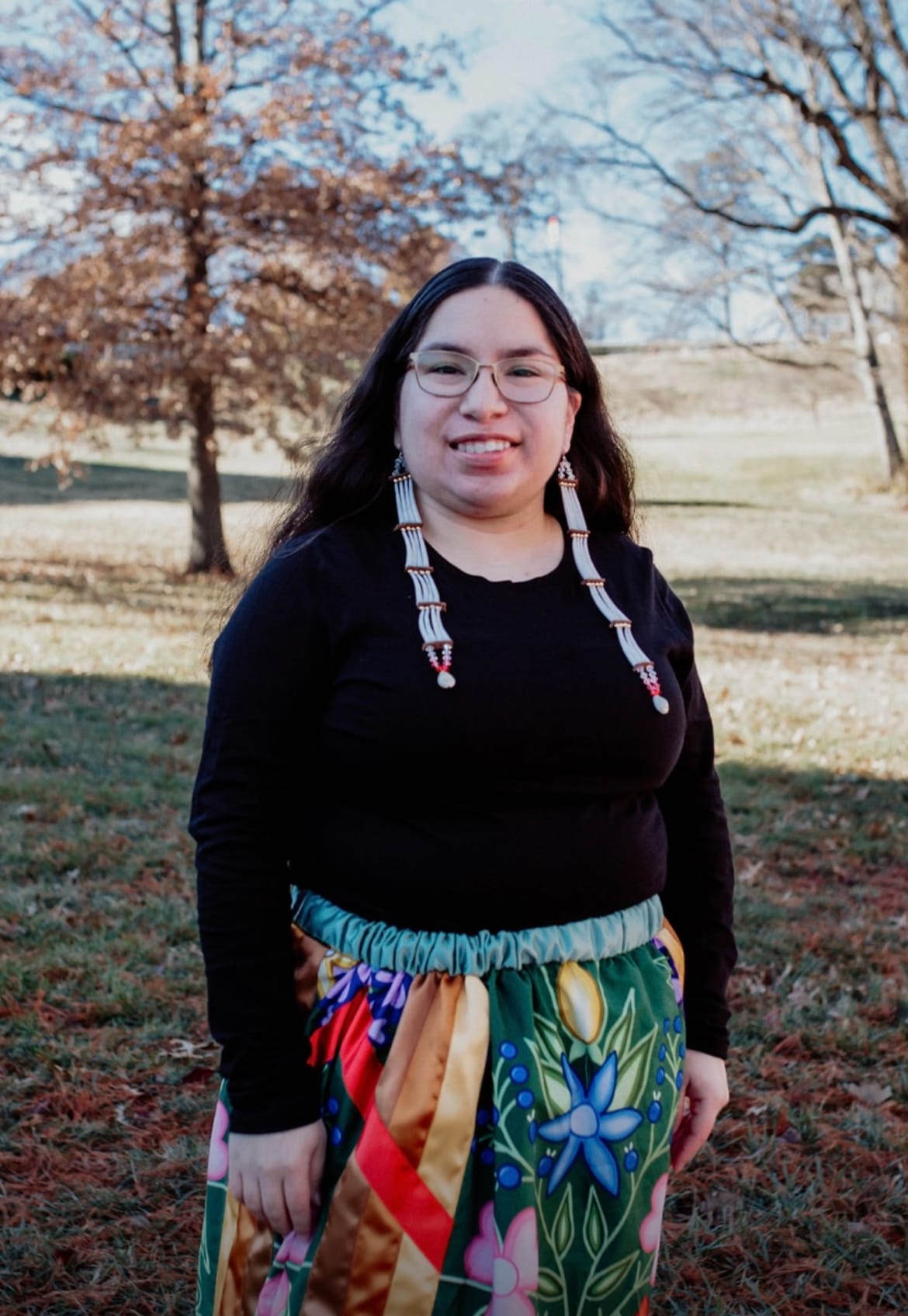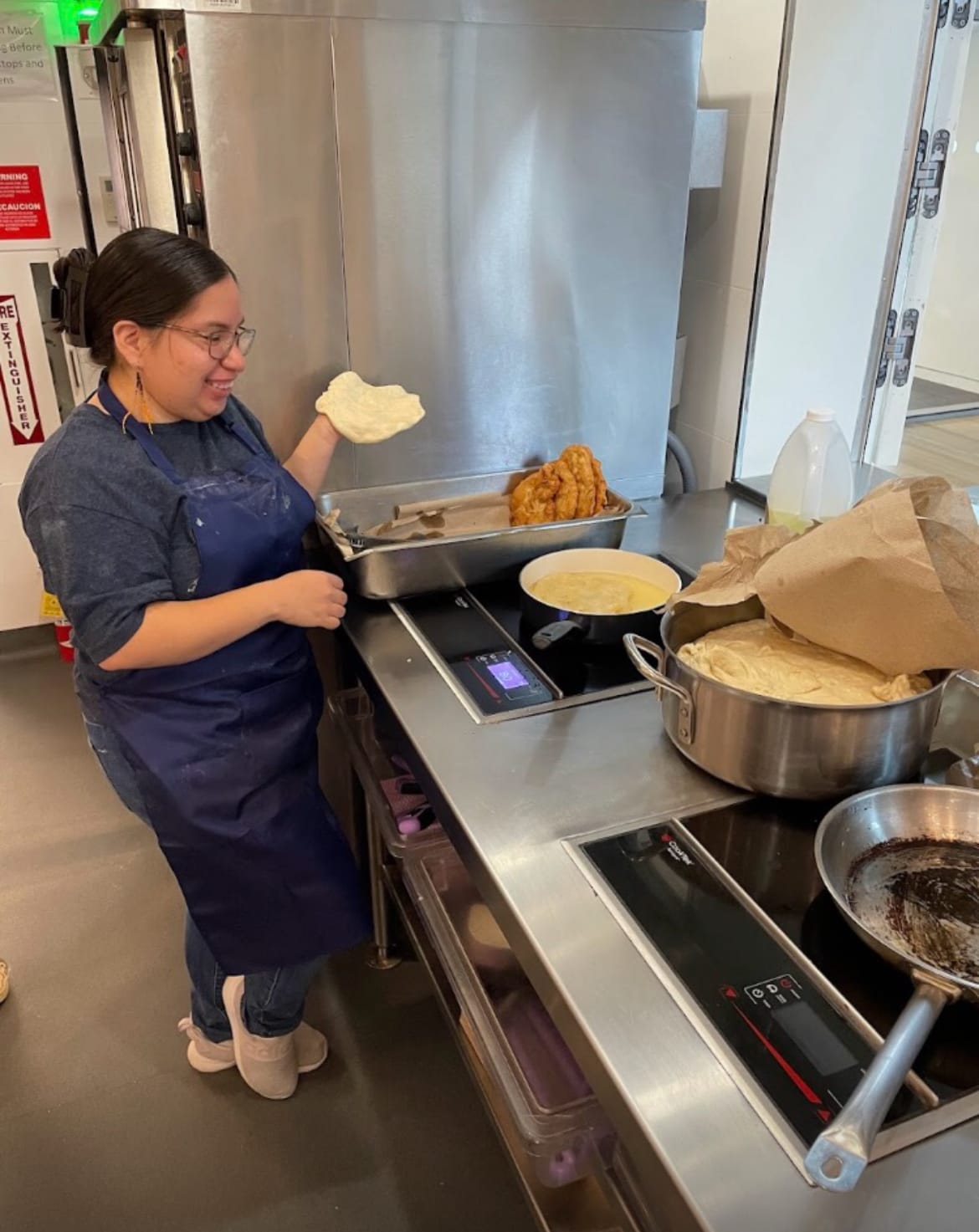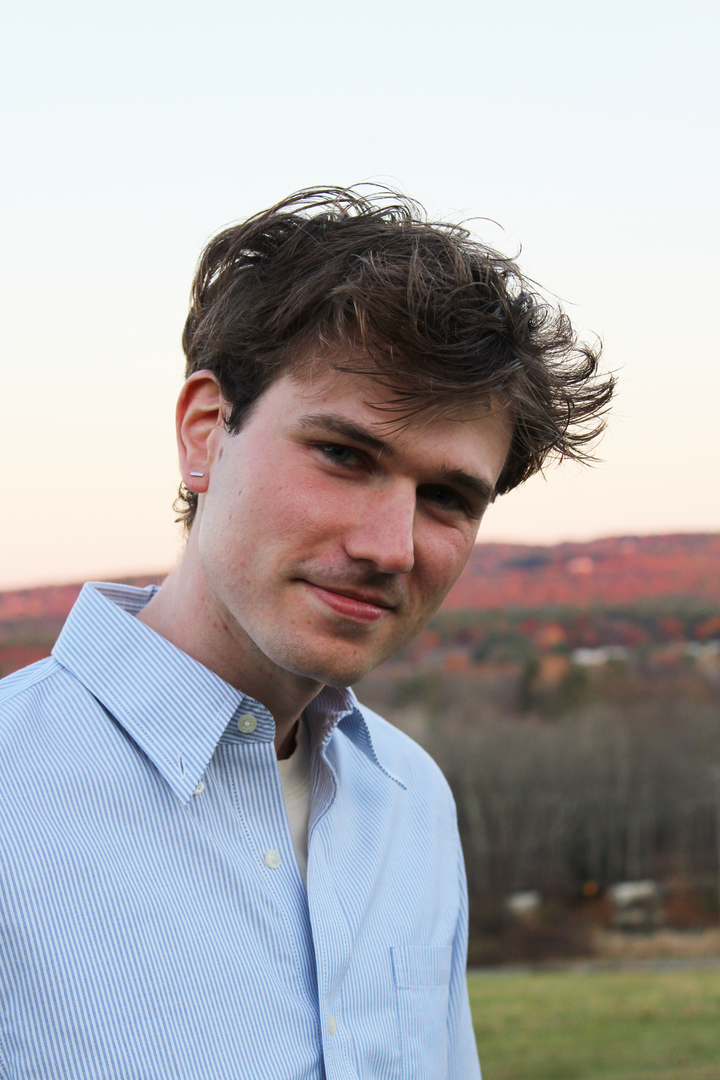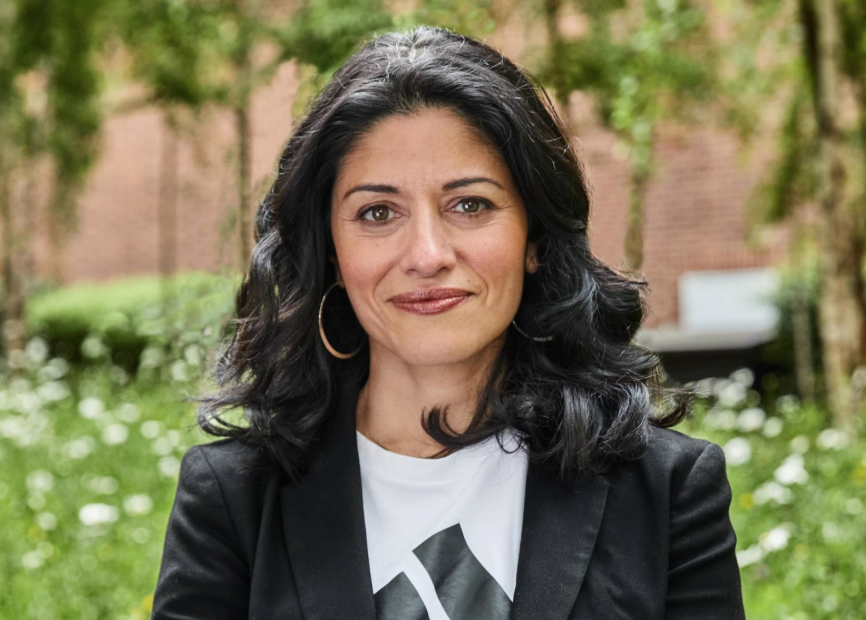Jacquelyn Cabarrubia: Building Community at Amherst and Beyond
Jacquelyn Cabarrubia’s commitment to fostering community manifests not only in her work revitalizing her heritage language, but also through her dedication to empowering and uplifting every person she meets.

It is an understatement to say that Jacquelyn Cabarrubia ’25 cares about community. From her leadership in the Native and Indigenous Students Association (NISA), mentorship of first-year students as a community advisor (CA), and tireless commitment to revitalizing her heritage language of Anishinaabemowin, forging community to empower others is at the core of everything Cabarrubia does.
As a double major in American studies and education studies, as well as a recipient of the Five College Native American and Indigenous Studies certificate, Cabarrubia has both embraced and challenged traditional modes of scholarship to uplift those around her. For the people in her life, this effect is unquestionable.
“Students like Jacqueline make me want to just keep teaching forever,” said Winthrop H. Smith 1916 Professor of American Studies and English Lisa Brooks, who both taught Cabarrubia and served as her mentor for the Mellon Mays Undergraduate Fellowship. “She just brings such energy and such positivity and such realness … Jacqueline has been able to both show vulnerability and also be a leader, and show that those are not mutually exclusive.”
“The type of friendship and community that [Cabarrubia] has taught [me] is something that I haven’t seen with anybody else, something that I hadn’t even known was an option before,” attested Chela Cunningham ’25, Jacquelyn’s first-year roommate and one of her closest friends. “I love her. That’s not something I say willingly, but if I’m gonna say it about anybody, it’s gonna be about her.”
The Journey to Amherst
Cabarrubia grew up in Manistee, Michigan in Odawa territory, which is called Naaminitigong, meaning “the land under the trees,” in Anishinaabemowin. While she began her educational journey in public schools, Cabarrubia left home in eighth grade to attend Native American boarding schools, living on campus until the emergence of Covid in the middle of her junior year of high school.
“My senior year was not even on campus at all; it was online,” Cabarrubia said. “Actually I was working the entire time. I had a restaurant job and I worked 40 hours a week, sometimes 50. That’s what [my senior year] looked like.”
During this time, Cabarrubia was also participating in the Upward Bound program at South Dakota State University, an experience which introduced her to Amherst. “[I had] a mentor there who said, ‘I think you’d be a good fit at Amherst,’” Cabarrubia said. “She knew that I liked small dynamics and told me, ‘I could see you succeeding in a smaller, more community-centered environment.’”
This advice inspired Cabarrubia to rank and eventually match with Amherst through QuestBridge. However, she had little knowledge of the college before arriving on campus. “I ’t know what a liberal arts education looked like,” Cabarrubia said. “I didn’t have [the] type of mentorship to tell me, ‘It's an open curriculum, you get to decide what works for you’ … And that may sound very uneducated, but I don't come from a community where you even knew [the practice of researching] your school. It was really all about, ‘How are you going to pay for college?’”
Cabarrubia’s first year at Amherst was therefore “extremely hard,” not only because she had to navigate unfamiliar academic expectations but also because the college’s student demographics presented a “huge culture shock.”
“[At my high schools] the entire population was Native students, and you have staff and teachers who are also Indigenous. And so coming here, I realized I did lose a part of me,” Cabarrubia said.
Specifically, Cabarrubia felt that she was “losing bits and pieces” of Anishinaabemowin while at Amherst. However, being alienated from her community and language eventually propelled Cabarrubia into discovering her passion for language work and, during her later years at the college, committing to formally learning Anishinaabemowin.
While Cabarrubia didn’t know what she was going to study upon arriving at Amherst, she credited the college’s open curriculum with helping her discover her passion for languages. In the fall of her sophomore year, she took the class “Anthropology of Music” with Karen and Brian Conway ’80, P’18 Presidential Teaching Professor of Music Jeffers Engelhardt, despite not knowing anything about the subject. “I wanted to challenge myself and learn a language that I'm not familiar with, which is all things music,” Cabarrubia said. “I learned the vocabulary of sonic and phonetic sounds, and I was able to weave that into my [study of language], because sound is weaved in everything.”
The course “Reading Land, Writing Waters,” taught by Brooks, also made a significant impact on Cabarrubia and her academic journey. Cabarrubia took the course during her first year at Amherst, finding it “eye-opening” because of its unique structure, with classes held entirely outside, as well as the student dynamic within the class.
“There were four other Indigenous seniors, and they had been waiting for that class since their freshman year. I got lucky that I got to have a class where I'm not the only Indigenous student, and I’m not the only one [who] has our community lens.” Cabarrubia said.
After these seniors graduated, Cabarrubia remained committed to forging Indigenous community at Amherst through her role as the co-chair of NISA. Most notably, Cabarrubia succeeded in securing a larger room for NISA in the basement of Morrow, ensuring that they had enough space to accommodate the expanding needs of the college’s Native community.
Community and Passion Outside the Amherst Classroom
Cabarrubia’s deep love for community has informed all of her experiences outside the classroom. Alongside her leadership in NISA, Cabarrubia held various jobs over the course of her four years at Amherst: she served as a Community Advisor (CA) in first-year dorms, conducted research for Heidi E. Erdrich’s “Boundless” exhibit at the Mead Art Museum, helped professors improve their classroom dynamics as a Pedagogical Partnership Program (P3) Fellow, completed beadwork as a Gregory S. Call Intern for Professor of Art and the History of Art Sonya Clark, and worked with the Native periodicals collections in the archives at Frost Library.
Cabarrubia’s three-year-long process of cataloging periodicals from various Native American tribal nations confirmed her passion for working with Indigenous languages. This interest inspired her to study abroad at Canterbury University in Christchurch, New Zealand during the spring of her junior year. “I knew I wanted to take an Indigenous language course, and I knew that it’s not something Amherst offers,” Cabarrubia said.
Originally, Cabarrubia planned to study at the University of Toronto because she really wanted to take Ojibwe, which is a dialect of Anishinaabemowin; however, she had to shift directions because this course was only offered as a full-year class.
In addition to her desire to learn Te Reo — the language of the Māori people — Cabarrubia was compelled to study at Canterbury because it would allow her to experience higher education as simply a student. “I had my hands in so many different places on campus … And I was thinking about how I’m not just a student; I’m an Indigenous student,” she said. “I wanted to see, ‘What does it look like to just be an Indigenous student without all of these other commitments?’”
At Canterbury, Cabarrubia lived and learned amongst many Māori students and professors, an experience which, for her, fulfilled her desire of relaxing and “just being a student.”
Cabarrubia lived in an apartment with four other flatmates while abroad, making her truly understand what it means to be an adult. “I feel like in the Amherst culture you’re not necessarily a young adult; you’re a student,” Cabarrubia said. She affirmed that this newfound independence improved the way she showed up in the classroom, making her feel more “confident” and “free.”
However, studying in New Zealand was not Cabarrubia’s only overseas experience during her time at Amherst. In the winter of her junior year, Cabarrubia, through a Hampshire College January Term class, completed a two-week field study in charter schools in Oahu, Hawaii. She then stayed in Hawaii for three more weeks as a research assistant for Ty P. Kāwika Tengan, a professor of ethnic studies and anthropology at University of Hawaii at Manoa. Working with Tengan’s oral transcription project, Cabarrubia fixed automated processor errors in the transcription of Ōlelo Hawaiʻi, the state’s official Polynesian language, “to make sure that we were sharing elder (or kapuna in Ōlelo Hawaiʻi) stories correctly.”
Furthermore, I personally had the pleasure of getting to know Cabarrubia when we both attended the Loeb Center’s Global Education Trek to Scandinavia this spring. We visited educational sites in Copenhagen, Denmark and Stockholm, Sweden, learning about models of schooling vastly different from what we’ve experienced in the U.S.
Cabarrubia remarked that she has benefited immensely from these opportunities “which Amherst provides us to challenge ourselves, put ourselves in environments that we’ve never seen before.”

Language Work
Language revitalization has not only been the focus of Cabarrubia’s research and senior capstone project, but is a passion that she hopes to pursue in all aspects of her life and future. Cabarrubia’s love for language work began with her exposure to Anishinaabemowin as an adolescent, which she received through attending Odawa ceremonies as well as participating in an after-school language program taught by a first-language speaker in her tribal community.
Cabarrubia didn’t understand how impactful this exposure was until she came to Amherst and realized that she was losing her Indigenous language. “I felt like a part of me was just gone here, and I didn’t want Amherst to take that away from me,” Cabarrubia said. “I was like, ‘How can I challenge this? How can I make my own journey here? How can I feel seen?’”
In order to maintain access to Anishinaabemowin, Cabarrubia started taking instructional Zoom courses for eight hours every weekend. Cabarrubia further infused this commitment to learning her heritage language into her research as a Mellon Mays Undergraduate Fellow, exploring Anishinaabemowin revitalization alongside the broader failures of language education in our public school system. “My research looks a lot different than my peers, because I'm saying I'm going to stay true to an Indigenous approach in going to my community and centering our own voices,” Cabarrubia said.
To continue to learn Anishinaabemowin, Cabarrubia took special topics classes, supervised by Brooks, via Zoom. In the fall of her junior year, Cabarrubia was in two different online classes learning two distinct dialects of Anishinaabemowin: Odawa Ojibwe and Potawatomi.
This year, Cabarrubia was enrolled in the program Biidwewdamowaad Nimkiig Biidaabang coordinated via Ninaatigoons Learning, which helps young adults gain the skills to speak and teach Anishinaabemowin. “‘Biidwewdamowaad Nimkiig Biidaabang’ means ‘the roaring of the light of those who are coming,’” Cabarrubia explained. “It alludes to the idea that those speakers [who] have been silent are coming, and they’re on their way.”
The program consists of five different classes: Anishinaabemowin grammar, conversation, listening, and speaking, as well as a special topics in education. “It’s a whole different university in itself,” Cabarrubia said. Funnily enough, the program is taught by Ninaatig Staats Pangowish, the professor of Indigenous studies at University of Toronto that Cabarrubia initially hoped to work with during her study abroad.
“We have a cohort of 12 students, and they’re all adult learners. Each of them have also come from different tribal nations; they’re Anishinabek, but they're from different bands in different nations,” Cabarrubia explained.
Cabarrubia’s involvement in this program, which is her senior capstone project in both the American studies and education studies departments, is a 24 hours per week commitment. Alongside Zoom classes, the program consists of in-person cohort and immersion gatherings as well as a three-week language camp in May where Cabarrubia and her peers will be teaching Anishinaabemowin to adult second language learners. The camp will run until May 23, after which Cabarrubia will immediately come back to Amherst so she can walk for Commencement.
“[Cabarrubia] is restoring to herself and her community something that was taken from them,” affirmed Dean of New Students, Program Chair of Education Studies, and Associate Professor of American Studies Kiara Vigil, who has been Cabarrubia’s professor as well as her major advisor.
“Language work is really hard, and everybody recognizes how important and vital it is, but not a lot of people have the capacity to be able to sustain it,” Brooks said. “Seeing Jacqueline do this has been such an inspiration and, for me, she really shows that language revitalization is truly possible.”
While Cabarrubia expressed gratitude at being able to participate in this program during her time at Amherst, she noted that it has also made her undergraduate journey a bit longer than is traditional. “I have to take one [summer course] after this semester … and then that's when I’ll be able to get my degree,” explained Cabarrubia. “That wasn’t what I thought was gonna happen, but that is okay. I’m walking away with my passion and I’m still gonna obtain my degree … Each and every one of us have our own journey, and that's something that I’ve highly taken to sharing as a mentor to multiple cohorts of first years and to NISA members.”
Empowering Others and Forging New Community
In the fall, Cabarrubia plans to teach K-12 students at a tribal school or Native students service school. While she hopes to attend graduate school sometime in the future, she believes that gaining classroom experience right now is “vital.” According to Cabarrubia, “When we think about going through a Ph.D., we talk about the impacts on our community, but if I don't have that lens, how can I talk about that?”
“[Teaching Anishinaabemowin] is one of the things that she’s going to be contributing to her community and to the world,” Brooks said. “To watch her confidence in that capacity and in that possibility grow has been amazing, and I am so proud of her.”
Cabarrubia is excited to not only teach young students language and academic skills, but also to empower them. “I can see in a lot of people their own light,” Cabarrubia said. “Each of us carry our own sparks and have our own passions, but there's a way that we can help cultivate each other in building that up … I want to bring a warmth to my students and to the people I'm around, because we don't really live in a society that welcomes that.”
Cunningham affirmed that one of the things she appreciates most about Cabarrubia is how she goes above and beyond to show her love and appreciation for others. “Right now she’s working on quilts for all the people that have taught her [during her time at Amherst],” she said. “The gift giving, the love giving, is something that I hadn’t thought about before, and it pushes me to be more thoughtful in the way that I choose to engage with my community.”
Cabarrubia vows that the skills she’s gained from her time at Amherst, from creating long-lasting communities to challenging expectations to being open to new experiences, will carry with her long after leaving campus. “What I’ve learned here is not going to stay here,” Cabarrubia said.





Comments ()